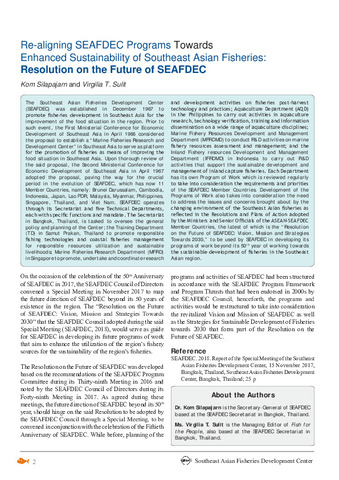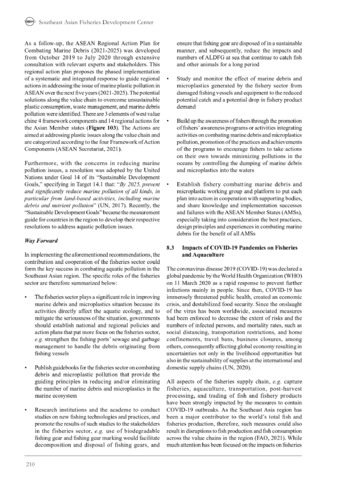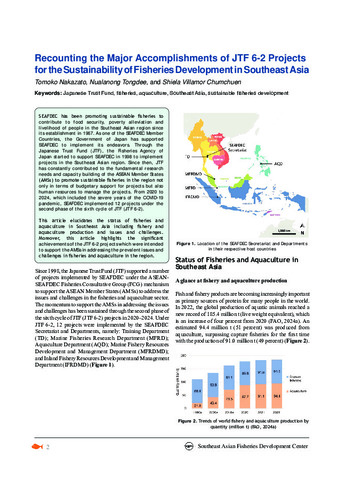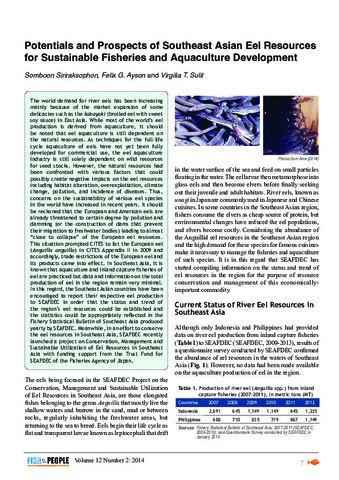Perlihatkan publikasi sederhana
Re-aligning SEAFDEC programs towards enhanced sustainability of Southeast Asian fisheries: Resolution on the future of SEAFDEC
Share
| dc.contributor.author | Silapajarn, Kom | |
| dc.contributor.author | Sulit, Virgilia T. | |
| dc.date.accessioned | 2018-06-18T06:46:55Z | |
| dc.date.available | 2018-06-18T06:46:55Z | |
| dc.date.issued | 2018 | |
| dc.identifier.citation | Silapajarn, K., & Sulit, V. T. (2018). Re-aligning SEAFDEC programs towards enhanced sustainability of Southeast Asian fisheries: Resolution on the future of SEAFDEC. Fish for the People, 16(1), 2-4. | en |
| dc.identifier.issn | 1685-6546 | |
| dc.identifier.uri | http://hdl.handle.net/20.500.12066/1355 | |
| dc.description.abstract | The Southeast Asian Fisheries Development Center (SEAFDEC) was established in December 1967 to promote fisheries development in Southeast Asia for the improvement of the food situation in the region. Prior to such event, the First Ministerial Conference for Economic Development of Southeast Asia in April 1966 considered the proposal to establish a “Marine Fisheries Research and Development Center” in Southeast Asia to serve as platform for the promotion of fisheries as means of improving the food situation in Southeast Asia. Upon thorough review of the said proposal, the Second Ministerial Conference for Economic Development of Southeast Asia in April 1967 adopted the proposal, paving the way for the crucial period in the evolution of SEAFDEC, which has now 11 Member Countries, namely: Brunei Darussalam, Cambodia, Indonesia, Japan, Lao PDR, Malaysia, Myanmar, Philippines, Singapore, Thailand, and Viet Nam. SEAFDEC operates through its Secretariat and five Technical Departments, each with specific functions and mandate. The Secretariat in Bangkok, Thailand, is tasked to oversee the general policy and planning of the Center; the Training Department (TD) in Samut Prakan, Thailand to promote responsible fishing technologies and coastal fisheries management for responsible resources utilization and sustainable livelihoods; Marine Fisheries Research Department (MFRD) in Singapore to promote, undertake and coordinate research and development activities on fisheries post-harvest technology and practices; Aquaculture Department (AQD) in the Philippines to carry out activities in aquaculture research, technology verification, training and information dissemination on a wide range of aquaculture disciplines; Marine Fishery Resources Development and Management Department (MFRDMD) to conduct R&D activities on marine fishery resources assessment and management; and theInland Fishery resources Development and Management Department (IFRDMD) in Indonesia to carry out R&D activities that support the sustainable development and management of inland capture fisheries. Each Department has its own Program of Work which is reviewed regularly to take into consideration the requirements and priorities of the SEAFDEC Member Countries. Development of the Programs of Work also takes into consideration the need to address the issues and concerns brought about by the changing environment of the Southeast Asian fisheries as reflected in the Resolutions and Plans of Action adopted by the Ministers and Senior Officials of the ASEAN-SEAFDEC Member Countries, the latest of which is the “Resolution on the Future of SEAFDEC: Vision, Mission and Strategies Towards 2030,” to be used by SEAFDEC in developing its programs of work beyond its 50th year of working towards the sustainable development of fisheries in the Southeast Asian region. | en |
| dc.language.iso | en | en |
| dc.publisher | Secretariat, Southeast Asian Fisheries Development Center | en |
| dc.subject | South East Asia | en |
| dc.title | Re-aligning SEAFDEC programs towards enhanced sustainability of Southeast Asian fisheries: Resolution on the future of SEAFDEC | en |
| dc.type | magazineArticle | en |
| dc.citation.volume | 16 | |
| dc.citation.issue | 1 | |
| dc.citation.spage | 2 | |
| dc.citation.epage | 4 | |
| dc.citation.journalTitle | Fish for the People | en |
| dc.subject.asfa | utilization | en |
| dc.subject.asfa | food | en |
| dc.subject.asfa | marine fisheries | en |
| dc.subject.asfa | fishery management | en |
| dc.subject.asfa | training | en |
| dc.subject.asfa | economics | en |
| dc.subject.asfa | sustainability | en |
| dc.subject.asfa | management | en |
| dc.subject.asfa | aquaculture | en |
| dc.subject.asfa | conferences | en |
| dc.subject.asfa | technology | en |
| dc.subject.asfa | research | en |
| dc.subject.asfa | fishing | en |
| dc.subject.asfa | livelihoods | en |
| dc.subject.asfa | coastal fisheries | en |
| dc.subject.asfa | sustainable development | en |
| dc.subject.asfa | countries | en |
| dc.subject.asfa | resolution | en |
| dc.subject.asfa | fishery resources | en |





